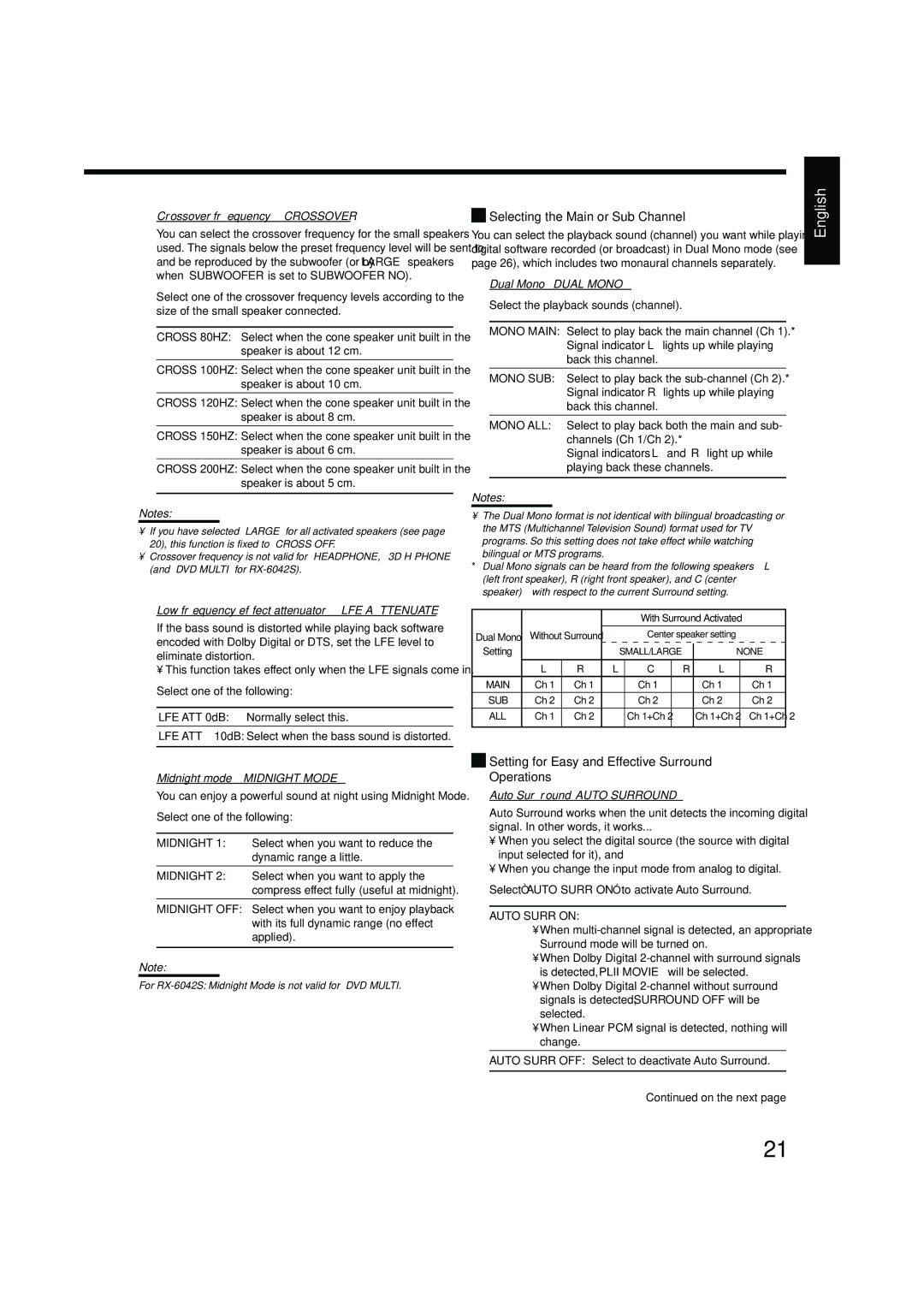
¶Crossover frequency—CROSSOVER
You can select the crossover frequency for the small speakers used. The signals below the preset frequency level will be sent to and be reproduced by the subwoofer (or by “LARGE” speakers when “SUBWOOFER” is set to “SUBWOOFER NO”).
Select one of the crossover frequency levels according to the size of the small speaker connected.
CROSS 80HZ: Select when the cone speaker unit built in the speaker is about 12 cm.
CROSS 100HZ: Select when the cone speaker unit built in the speaker is about 10 cm.
CROSS 120HZ: Select when the cone speaker unit built in the speaker is about 8 cm.
CROSS 150HZ: Select when the cone speaker unit built in the speaker is about 6 cm.
CROSS 200HZ: Select when the cone speaker unit built in the speaker is about 5 cm.
Notes:
•If you have selected “LARGE” for all activated speakers (see page 20), this function is fixed to “CROSS OFF.”
•Crossover frequency is not valid for “HEADPHONE,” “3D H PHONE” (and “DVD MULTI” for
¶Low frequency effect attenuator—LFE ATTENUATE
If the bass sound is distorted while playing back software encoded with Dolby Digital or DTS, set the LFE level to eliminate distortion.
• This function takes effect only when the LFE signals come in.
Select one of the following:
LFE ATT 0dB: Normally select this.
LFE ATT −10dB: Select when the bass sound is distorted.

 Selecting the Main or Sub Channel
Selecting the Main or Sub Channel
You can select the playback sound (channel) you want while playing digital software recorded (or broadcast) in Dual Mono mode (see page 26), which includes two monaural channels separately.
¶Dual
Select the playback sounds (channel).
MONO MAIN: Select to play back the main channel (Ch 1).* Signal indicator “L” lights up while playing back this channel.
MONO SUB: Select to play back the
MONO ALL: Select to play back both the main and sub- channels (Ch 1/Ch 2).*
Signal indicators “L” and “R” light up while playing back these channels.
Notes:
•The Dual Mono format is not identical with bilingual broadcasting or the MTS (Multichannel Television Sound) format used for TV programs. So this setting does not take effect while watching
bilingual or MTS programs.
*Dual Mono signals can be heard from the following
|
|
|
|
|
|
|
|
| With Surround Activated |
|
|
|
|
|
|
| |||||||||||||||||||
|
|
|
|
|
|
|
|
|
|
|
|
|
|
|
|
|
|
|
|
|
|
|
|
|
|
|
|
|
|
|
|
| |||
Dual Mono | Without Surround |
|
|
|
|
|
|
| Center speaker setting |
|
|
|
|
|
|
| |||||||||||||||||||
Setting |
|
|
|
|
|
|
|
|
|
|
|
|
|
|
|
|
|
|
|
|
|
|
|
|
|
|
|
|
|
|
|
|
|
|
|
|
|
|
|
| SMALL/LARGE |
|
|
|
|
|
|
|
|
|
| NONE | |||||||||||||||||||
|
|
|
|
|
|
|
|
|
|
|
|
|
|
|
|
|
|
|
|
|
|
|
|
|
|
|
|
|
|
|
|
|
|
|
|
| L | R | L |
|
|
|
| C |
| R |
|
|
|
| L |
|
| R | |||||||||||||||||
MAIN | Ch 1 | Ch 1 | — |
|
|
| Ch 1 |
| — |
|
| Ch 1 |
| Ch 1 | |||||||||||||||||||||
|
|
|
|
|
|
|
|
|
|
|
|
|
|
| |||||||||||||||||||||
SUB | Ch 2 | Ch 2 | — |
|
|
| Ch 2 |
| — |
|
| Ch 2 |
| Ch 2 | |||||||||||||||||||||
ALL | Ch 1 | Ch 2 | — |
| Ch 1+Ch 2 |
| — | Ch 1+Ch 2 | Ch 1+Ch 2 | ||||||||||||||||||||||||||
|
|
|
|
|
|
|
|
|
|
|
|
|
|
|
|
|
|
|
|
|
|
|
|
|
|
|
|
|
|
|
|
|
|
|
|
English
¶Midnight
You can enjoy a powerful sound at night using Midnight Mode.
Select one of the following:
MIDNIGHT 1: Select when you want to reduce the dynamic range a little.
MIDNIGHT 2: Select when you want to apply the compress effect fully (useful at midnight).
MIDNIGHT OFF: Select when you want to enjoy playback with its full dynamic range (no effect applied).
Note:
For

 Setting for Easy and Effective Surround Operations
Setting for Easy and Effective Surround Operations
¶Auto Surround—AUTO SURROUND
Auto Surround works when the unit detects the incoming digital signal. In other words, it works...
•When you select the digital source (the source with digital input selected for it), and
•When you change the input mode from analog to digital.
Select “AUTO SURR ON” to activate Auto Surround.
AUTO SURR ON:
•When
•When Dolby Digital
•When Dolby Digital
•When Linear PCM signal is detected, nothing will change.
AUTO SURR OFF: Select to deactivate Auto Surround.
Continued on the next page
21
